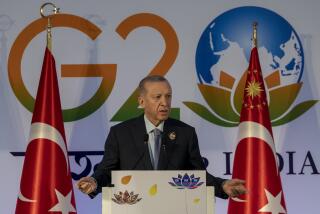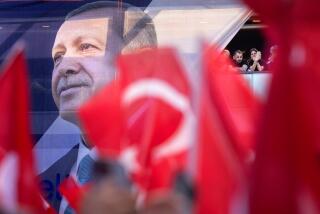Turkey and U.S. Boost Ties With Pipeline, Aircraft Deals
- Share via
WASHINGTON — His country jilted in recent days by two powerful blocs of nations, Turkish Prime Minister Mesut Yilmaz on Friday ended a whirlwind visit here with assurances of stronger U.S. ties.
After a day of hectic diplomacy in which Yilmaz met President Clinton, Vice President Al Gore and four Cabinet members, senior U.S. officials said Washington and Ankara had agreed to strengthen relations in various areas, including trade and regional cooperation.
The agreement includes high-level visits by U.S. trade and human rights officials to Turkey early next year, a trip by Secretary of State Madeleine Albright next summer and a follow-up summit between Clinton and Yilmaz at the end of next year, administration officials said.
“This represents a solid step forward in U.S.-Turkish relations,” declared a senior U.S. official involved in Friday’s talks.
It is a step that came as Turkey is reeling from back-to-back snubs--first from a conference of Islamic nations, which chastised Ankara in its recent meeting for its ties with Israel, then from the European Union, which seemed to douse Turkey’s long-nurtured dream of membership in that group.
Turkey, a strategically located moderate Muslim nation, has long been viewed by U.S. officials as an important ally.
Once an anchor to the North Atlantic Treaty Organization’s southern flank against expansionism by the old Soviet Union, the country is now seen as a counterbalance to Islamic fundamentalism in the region.
But Turkey’s spotty human rights record, which includes harsh treatment of its Kurdish minority and a tendency to jail journalists, has clouded relations and led Congress to deny arms sales to Ankara.
Although Yilmaz on Friday failed to win concessions on some issues, like a reduction of tariffs on imported Turkish textiles, he appeared to achieve his larger goal of building new meaning into the U.S.-Turkish relationship.
In a meeting with Energy Secretary Federico Pena, Yilmaz signed a U.S.-Turkish agreement to promote construction of a 900-mile pipeline taking Caspian Sea oil across eastern Turkey to the Turkish Mediterranean port of Ceyhan.
Although the line is longer than alternatives either through Russia or Iran and, at an estimated $4-billion cost, almost twice as expensive, the U.S. wants the link to pass through friendly territory.
If built, the pipeline would provide hefty transit fees for Ankara, as well as adding to its political leverage in the region.
Yilmaz also signed a $2.5-billion deal with Boeing to buy 49 commercial 737-800 aircraft.
*
Ankara’s ties with other Muslim nations cooled earlier this month when the Islamic conference, meeting in Iran, voted to condemn member countries, including Turkey, that maintain relations with Israel.
Turkish President Suleyman Demirel walked out after the vote and left Iran before the conference ended.
Turkey’s relations with the 15-member European Union nose-dived last Saturday after EU leaders in Luxembourg formally agreed to begin negotiations for eventual membership with 11 nations but set aside Ankara’s request for the same treatment.
Yilmaz treated the decision as a national insult. He quickly withdrew from a dinner of European leaders that evening and, in the days since, has leveled a series of verbal threats and accusations at Europe.
Meeting with reporters here, he accused a minority of EU countries, led by Germany’s Chancellor Helmut Kohl, of conspiring to preserve the union as a body “based on Christian principles. . . . There is no space for a country which doesn’t share this cultural identity.”
While German officials on Friday denied the charge, it is no secret that the EU’s large Brussels-based bureaucracy considers Turkey’s aspiration for membership a problem mainly on cultural grounds.
Yilmaz also raised the threat that the EU action would complicate the 2-decade-old battle over the divided island of Cyprus, forcing the minority Turkish Cypriot community there closer to Ankara as the Greek part of the island begins negotiating for EU membership.
More to Read
Sign up for Essential California
The most important California stories and recommendations in your inbox every morning.
You may occasionally receive promotional content from the Los Angeles Times.









